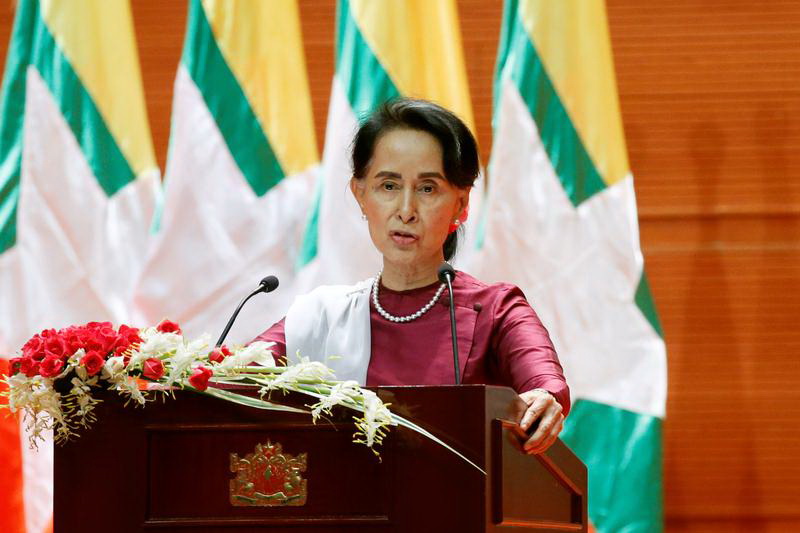In perhaps the biggest speech of her political life, State Counsellor Aung San Suu Kyi on Tuesday sought the international community’s understanding and support as Burma grapples with insurgency and the repercussions of security forces’ counteroffensive in Arakan State.
“We feel deeply for the suffering of all the people who have been caught up in the conflict,” she told an audience in Naypyidaw that included members of the foreign diplomatic corps, as she repeatedly exhorted the international community to “join us” in efforts to resolve internal strife and develop the nation.
The country’s de facto leader also said state security forces had been instructed “to adhere strictly to the code of conduct, to exercise all due restraint, and to take full measures to avoid collateral damage and the harming of innocent civilians.”
The pushback against growing concern of human rights violations allegedly committed by security forces in northern Arakan State over recent weeks came in a 30-minute speech that marked some of the state counsellor’s first public remarks on the crisis in Arakan, also known as Rakhine.
“There has been much concern around the world with regard to the situation in Rakhine. It is not the intention of the Myanmar government to apportion blame or to abnegate responsibility. We condemn all human rights violations and unlawful violence,” she said, adding, “Human rights violations, and all other acts that impair stability and harmony and undermine the rule of law, will be addressed in accordance with strict norms of justice.”
The latest UN estimate puts the number of Rohingya Muslims who have fled across the border into Bangladesh at more than 400,000, with the mass exodus shining an international spotlight once again on troubled Arakan State. The refugee crisis was triggered by a 25 August assault on several police posts and an army base by the Arakan Rohingya Salvation Army (ARSA) and a heavy-handed counter-insurgency campaign launched in the aftermath, with security forces once again accused of a disproportionate response and the UN’s top human rights official describing their conduct as a “textbook case of ethnic cleansing.”
The Burmese government says more than a dozen police and military personnel have been killed as well as several civilians, presumably by the ARSA insurgents, and that counter-insurgency operations have led to the deaths of hundreds of Rohingya militants. It also says some 30,000 “ethnics” — a term understood to connote non-Rohingya — have been internally displaced.
Human rights groups and newly arrived Rohingya refugees in Bangladesh, meanwhile, have alleged that security forces have committed atrocities against innocent civilians, including women and children, during military “clearance operations” aimed at rooting out ARSA militants.
Late last week, Amnesty International said it had collected evidence that pointed to “a mass-scale scorched-earth campaign across northern Rakhine State, where Myanmar security forces and vigilante mobs are burning down entire Rohingya villages and shooting people at random as they try to flee.”
The human rights advocacy group cited testimonies obtained from dozens of witnesses, satellite imagery, and photos “from the ground,” in making its assessment about the violence that has torn through northern Arakan State.
The government has steadfastly denied that any widespread misconduct by security forces has taken place.
Many of the claims, on both sides of an increasingly apparent divide between Burmese state media and international news organisations’ coverage of the unfolding crisis, have been difficult to verify in the context of a highly militarised — and access-restricted — environment in northern Arakan State.
“There have been allegations and counter-allegations, and we have to listen to all of them,” Suu Kyi said on Tuesday. “And we have to make sure that these allegations are based on solid evidence before we take action. Action will be taken against all peoples — regardless of their race, religion or political position — who go against the laws of the land, and who violate human rights as accepted by our international community.”
Burma has been facing mounting criticism from the international community in the wake of the 25 August attacks by ARSA. The leaders of several nations, and the UN secretary-general, have urged Suu Kyi to act more forcefully to stop the violence in Arakan State.
On Tuesday, Suu Kyi attempted to allay those concerns by saying that “more than 50 percent of the villages of Muslims are intact. They are as they were before the attacks took place.”
But that statement in itself was a remarkable acknowledgement of the destruction wrought in northern Arakan State over recent months.
[related]
Based on 2014 census data and the refugee numbers reported by the UN, nearly half of Arakan State’s Rohingya Muslim population has fled to Bangladesh since 9 October, when an initial ARSA attack triggered an exodus of tens of thousands.
“We want to find out why this exodus is happening. We would like to talk to those who have fled, as well as those who have stayed,” Suu Kyi said.
The state counsellor reportedly had planned to attend the annual UN General Assembly confab, which is scheduled to convene on Tuesday in New York. However, a spokesman for her party said that she would forgo the global forum, suggesting that “perhaps she’s got more pressing matters here to deal with,” according to Reuters.



